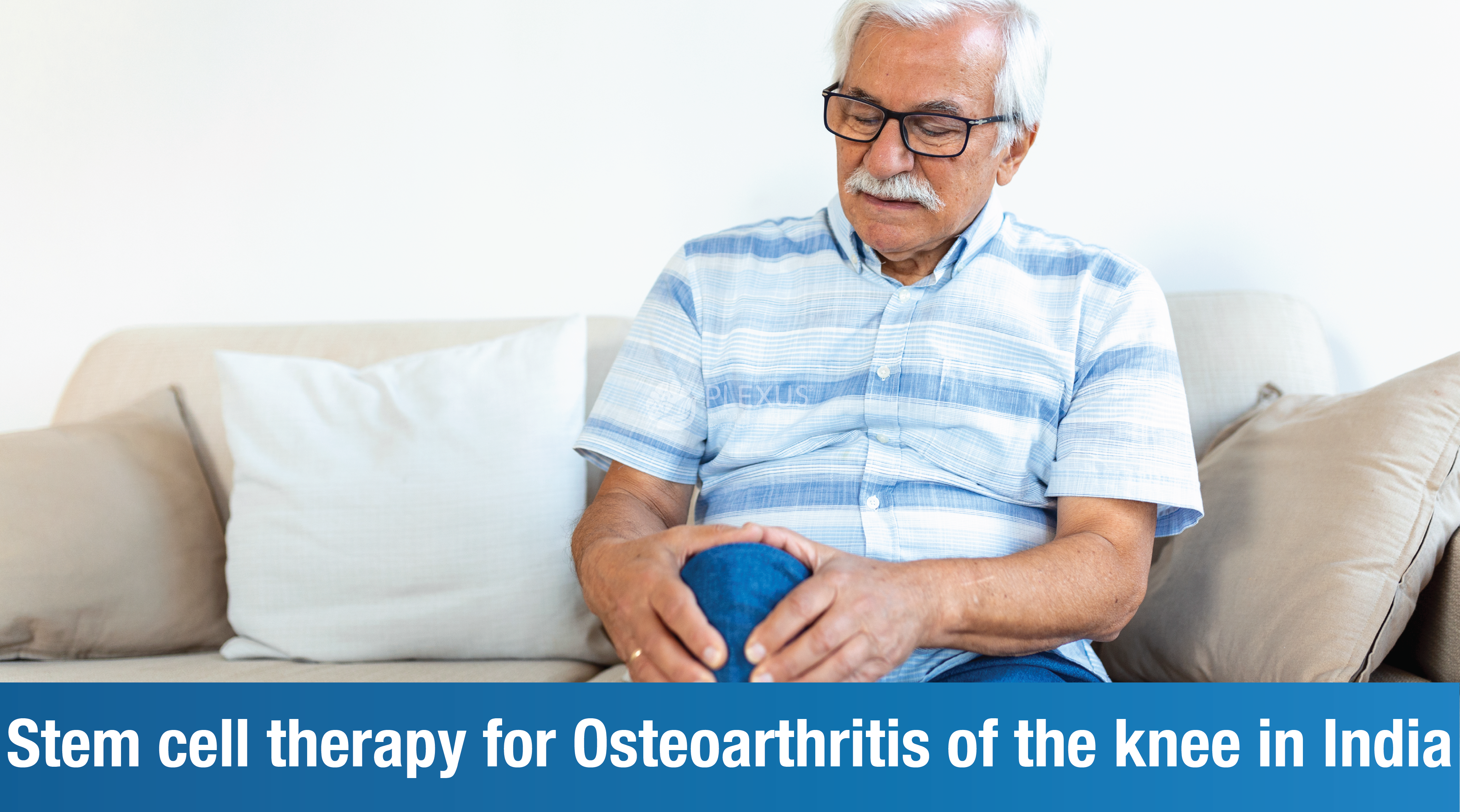
Stem cell therapy for Osteoarthritis of the knee in India
If you’re over 40 years of age and experience pain in your knees while walking, climbing stairs, or even standing up after sitting for long periods (vice-versa) then you could be having osteoarthritis of the knee(s).
In this article, we’ll take a look at this degenerative form of arthritis and understand the best course of therapy available in India.
Osteoarthritis
Commonly known as wear-and-tear arthritis, Osteoarthritis is a degenerative condition that is caused by the wearing away of cartilage, the natural cushioning between joints.
Simply put, the cartilage acts like a shock-absorber between joints. As it becomes thinner and thinner, the ends of the bones begin to rub against each other. This can lead to pain, stiffness, swelling, and decreased movement. There have also been cases of formation of bone spurs.
Osteoarthritis of the knee is caused by the decline or loss of cartilage in the knee joints. Remember, the knee joints comprise three joints between four bones – femur (thigh bone), patella (knee cap), tibia (shin bone), and fibula (calf bone).
Symptoms of osteoarthritis in the knee
Knee pain is the most common symptom of osteoarthritis in the knee. This pain may be experienced during movement or even when sitting still.
The other symptoms of osteoarthritis in the knee are:
-
- Stiff knee
- Puffy or swollen knee
- Grinding or cracking sound when moving the knee
- Wobbly knee
- Locked knee (as though stuck)
Causes of osteoarthritis of the knee
Nearly 46% of people develop osteoarthritis of the knee during the course of their lifetime. And while women are more susceptible to the condition, there are other factors we need to consider too.
Age: As you grow older, your cartilage also ages, thus losing its shock-absorbing capacity.
Weight: Research shows that if your Body Mass Index (BMI) is over 30, you are at risk of osteoarthritis in the knee. Excess weight increases pressure on the joints, especially the knee.
Family history: Abnormalities in the shape of the bones that surround the knee joint are invariably inherited. So, if a relative or a close family member has this condition, your chances of developing it increase substantially.
Athletics: Athletes and sportspersons involved in tennis, football, cycling, long distance running, etc. put extreme pressure on their knee joints. Most marathon runners experience “runner’s knee.” Osteoarthritis can be considered an advanced and degenerative version of runner’s knee.
Repetitive stress injuries: These are like occupational markers on the bones. People with occupations that involve activity that puts pressure on the joints are susceptible to osteoarthritis of the knee.
Other disorders: Rheumatoid arthritis is invariably accompanied by osteoarthritis of the knee. Similarly, patients with certain types of metabolic disorders, such as excess growth hormone, are also at risk of the condition.
How does stem cell therapy for osteoarthritis of the knee work?
Our body is capable of self-healing, and a robust immune system supports this super power.But degenerative diseases can disrupt this function.
Stem cell therapy helps the body regain this ability.
Mesenchymal stem cells are procured from the patient’s bone marrow. The stem cells are then cultured in a laboratory where they differentiate into daughter cells. These daughter cells are then injected back into the patient’s knee. Mesenchymal stem cells can self-renew and differentiate into different types of cells. Once these cells are injected into the knee, they assume the function of damaged cells in the cartilage. Over time, these cells multiply and grow into tissue, and eventually cartilage. Thus, new and healthy cartilage is generated, reducing friction between bones.
Apart from being a minimally-invasive and non-surgical procedure, stem cell therapy reduces inflammation and helps in the management of pain. It also considerably slows down the rate of progression of the condition.
Why choose stem cell therapy for osteoarthritis?
Opting for stem cell therapy to manage your osteoarthritis has many advantages. We’ve listed some of them below:
- Non-surgical procedure
- Nerve protection and tissue regeneration
- Slowing down rate of progression
- Better pain management and therefore, improved quality of life
- Immune system modulation
- Reduced inflammation
- Risk-free as stem cells are procured from the patient’s body
At Plexus, we believe stem cell therapy offers you a new lease on life. And while osteoarthritis may be a degenerative condition, your life does not have to come to a stand still!
If you’d like to know more about stem cell therapy for osteoarthritis of the knee, reach out to us. Our team of experienced stem cell specialists, headed by Dr Na’eem Sadiq will help you find the best care programme for your condition.
Call +91 89048 42087 | 080-2546 0886
080-2547 0886 | 080-2549 0886
FAQs
What is the success rate of stem cell therapy for knees?
This can differ on a case to case basis. However, nearly 85% patients who’ve received stem cell therapy for their knees have experienced a decrease in resting pain, and 68% have reported overall improvement of symptoms. Osteoarthritis is a degenerative condition. The success of its care program can only be measured by how effectively its symptoms are managed.
How much does stem therapy therapy for knee arthritis cost?
The cost can differ from case to case based on the number of injections that will be provided to the patient.
How long does stem cell therapy for knees last?
It can last anywhere from 6 months to several years.
Can stem cell therapy regrow cartilage in the knee?
Yes, it can.
Is stem cell therapy safe for knees?
Yes, it is.
Is stem cell therapy better than knee replacement?
As long as the degeneration is not severe, and the patient does not experience debilitating pain, stem cell therapy can be considered a better option than knee replacement.










